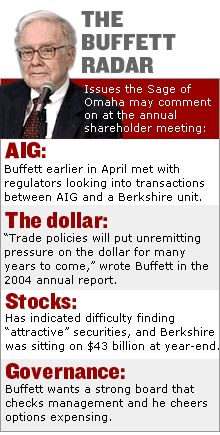 |
 | | A 17-part series on how to achieve maximum returns for the right amount of risk. See all the lessons. |
|
|
|
|
| Source: Berkshire Hathaway 2004 annual report |
|
|
NEW YORK (CNN/Money) -
Investors always await Warren Buffett's two annual pronouncements on the state of the market and the wisest strategy for the coming year.
One is Buffett's letter to shareholders in Berkshire Hathaway's annual report. The most recent letter is available on Berkshire's Web site.
Buffett's second discourse comes at Berkshire's annual shareholders meeting, which is normally held the first Saturday of May. But since that date falls on the Mother's Day weekend this year, Buffett has moved the meeting up a week.
One thing Buffett always says is that people who try to forecast short-term stock market moves are engaged in a futile enterprise. I agree with that, based on my own experience. But even if I can't forecast the next move in the Dow, perhaps I can predict what Buffett is going to say.
As anyone who follows Buffett knows, the superstar investor believes in buying extremely well-managed businesses with some inherent competitive advantages. He is value-conscious, but he is also willing to pay up a little bit for real quality. And his preferred holding period is forever.
Over the long run, this strategy has been enormously successful. By one measure, Buffett has earned double the return of the S&P 500 during the past 40 years.
Even during the past five years, Buffett has outperformed the Dow by a total of more than 40 percentage points. What's equally interesting, though, is that Buffett has slightly lagged the Dow over the past two years.
There's an explanation for this unimpressive recent performance. The greatest strength of Buffett's portfolio is that it holds up much better than the overall market during major declines. In addition, he buys well when values abound, and his holdings perform strongly when price/earnings ratios rise for high-quality, large-cap growth stocks.
Unfortunately, none of these trends has been active during the past two years. We haven't been in an actual bear market and yet P/E multiples on top growth stocks have remained below the historical norm.
Investing with patience
Buffett doesn't like to make forecasts -- he generally just says that one can find at least a few good values in any market. But he did note at last year's shareholder meeting that in 1999 his expectations for the market's performance over the following few years were much more modest that those of many forecasters.
I expect that we'll continue to hear more of the same. In his most recent letter to shareholders in February, Buffett said that he found very few attractive securities to buy in 2004. He also noted that Berkshire's cash hoard had increased to $43 billion at year's end, a fact he was unhappy about.
One other comment stood out in his February letter. He remarked that since 1970, the S&P 500 has earned a compound annual return of 11.2 percent. But he further remarked that it was unusual for the market to earn between 8 and 14 percent in any given year. The return was almost always much higher or much lower than the average.
In fact, Buffett is buying now, since he has so much cash to put to work. But I suspect he is braced for subpar returns.
Berkshire's most recent purchase, announced last week, is a sizable stake in Anheuser-Busch, the maker of Budweiser. In most ways, it's a classic Buffett pick. At $47.28 a share, Anheuser (Research) isn't screamingly cheap, trading for 16 times next year's estimated earnings. Moreover, after the stock rallied on news of Buffett's purchases, a couple of analysts downgraded the shares, warning that Anheuser could face some disappointing sales trends over the next couple of quarters.
Nonetheless, the company controls roughly half the U.S. beer market. It also enjoys a high return on equity and generates lots of free cash flow. And whatever the near-term negatives may be, Buffett obviously believes he is locking in a great long-term value -- and he's willing to wait years, if he has to, for that to pay off fully.
So here's my prediction for Saturday: I imagine that Buffett will again warn investors not to expect the kinds of crazy returns shareholders enjoyed during the late 1990s. I expect that he'll complain about the current difficulty of finding great values and about the mounds of cash he has accumulated and needs to invest.
On the other hand, he'll probably acknowledge that the below-average gains of the market over the past couple of years have created more mildly undervalued opportunities. He'll add that it's important to invest cash reserves when possible, if you can find high-quality companies with good long-term prospects.
Most of all, he'll remind everyone that short-term trends are unpredictable, but that high-quality stocks with above-average growth prospects bought at reasonable prices generally pay off over the long term.
Finally, he'll add that the unexpected is actually statistically more likely than the average and that all successful investing has two foundations -- a common-sense recognition of basic value and a whole lot of patience.
Sivy on Stocks resources:
Sivy 70: America's best stocks
Guide to Growth
___________________
Michael Sivy is an editor-at-large for MONEY magazine. Click here to receive Sivy on Stocks via e-mail every Monday.

|